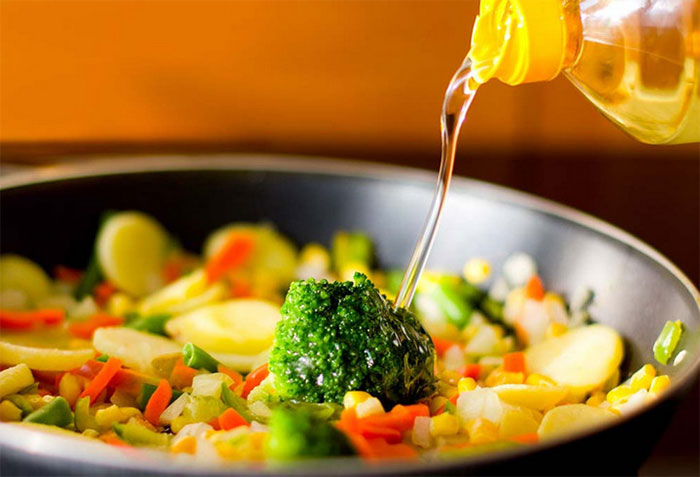All edible oils contain fats and calories, but their chemical properties and effects on our health can vary widely.
Cooking oil has long been a staple in kitchens as it helps us fry, fry and make food tastier. But so far, there is still a lot of conflicting information about the health effects of cooking oil.

Cooking oil helps us fry, fry and make food tastier.
When there are so many types of oils in the market like olive oil, canola oil, sunflower oil, rice oil, … then which oils are best for the health and which oils should be avoided or limited?
Oils used for cooking mainly take their names from nuts, fruits, plants or grains. They are extracted by crushing, pressing or processing method. Cooking oils are characterized by their high fat content, including saturated fat, monounsaturated and polyunsaturated fatty acids.
In recent years, coconut oil, with around 90% saturated fat, has become the most popular “superfood”. It is hailed as a superfood because it is less likely to cause the body to store fat. But according to an epidemiologist at Harvard University, it is “pure poison”.
Consuming too much saturated fat, over 20 grams for women and 30 grams for men per day, causes the body to produce cholesterol and increases risk, according to British nutritionists. muscle with heart disease.
All fat molecules are made up of chains of fatty acids and held together by single (saturated) or double (unsaturated) bonds. There are three types of fatty acids: short, medium and long chain. Short and medium chain fatty acids are normally absorbed directly into the bloodstream and used for energy. But long-chain fatty acids are transported to the liver and raise blood cholesterol levels.

“Coconut oil was popular three or four years ago when it was claimed to have special effects,” Alice Lichtenstein, professor of politics and nutritional science at Tufts University in Massachusetts, told the United States. When you look at studies that compare it to other oils, the results show that they are high in saturated fat and there are no clinical trials backing the previous claims about coconut oil’s benefits.
Most randomized trials have shown that coconut oil increases the levels of the harmful cholesterol, low density lipoprotein (LDL). These are the main causes of heart disease and stroke. But of course, it also increases good cholesterol, high density lipoproteins (HDL), and carries LDL out of the blood.
Which cooking oil should be most beneficial for your health?
The reason that foods high in saturated fat can raise HDL cholesterol is because it contains a relatively high amount of lauric acid. This substance is believed to increase HDL levels in the blood more than LDL. For this reason, experts recommend choosing oils that are low in saturated fat and other healthy fats.
But Taylor Wallace, an assistant professor in the Department of Nutrition and Food Research at George Mason University in Virginia, said lauric acid was not as healthy as some previous claims.
It is classified as a C12 fatty acid, which means it has 12 carbon atoms and is considered a medium chain fatty acid. But about 70% of C12 fatty acids act like long chain fatty acids and will usually go to the liver. Longer chain fatty acids are usually stored in the liver as fat and over time can cause health problems such as fatty liver disease.
Instead, experts recommend choosing an oil lower in saturated fat and other healthy fats. Polyunsaturated fats, including omega3 and omega6, monounsaturated fats work to lower cholesterol in the blood and provide essential fatty acids and vitamins. They are found in many types of vegetable oils, although the exact amount depends on the plant and the technological process involved in production.
“Most studies have shown that foods high in monounsaturated and polyunsaturated fats are associated with a lower risk of cardiovascular disease. We recommend people replace them, ”said Lichtenstein. The source of unsaturated fats is polyunsaturated fats, mainly vegetable oils from nuts and seeds.
Specifically, an observational study involving the replacement of saturated fat with olive oil showed that the risk of cardiovascular disease was significantly reduced. Replacing certain oils with butter, margarine, mayonnaise, or olive oil will help reduce the risk of heart disease by 5-7%.

Olive oil will help reduce the risk of cardiovascular disease by 5-7%.
Marta Guasch-Ferre, study author and current in the nutrition department of the TH Chan School of Public Health at Harvard University analyzed the health and diet of more than 100,000 people over 24 years and found that people with high olive oil consumption had up to 15% less risk of cardiovascular disease.
Olive oil, made by crushing olives and separating the oil from their pulp, and olive oil is known to be the healthiest vegetable oil. The health benefits of olive oil are partly due to its monounsaturated fatty acids, vitamins and minerals such as polyphenols, micronutrients of plant origin.
The study also confirmed that olive oil is beneficial for the intestinal microflora and reduces the risk of heart disease. In addition, virgin olive oil also helps in the prevention of cancer and type 2 diabetes.
That is why Guasch-Ferre thinks that we should replace other harmful fats with olive oil. Combining olive oil and a Mediterranean diet with lots of fruits, vegetables, and beans and low in saturated fat will definitely reduce the risk of heart disease significantly despite its high fat content. .
“What sets the Mediterranean diet apart from other healthy diets is that it uses olive oil,” Guasch-Ferre explains.
On the other hand, some studies suggest that these health benefits may be due to other ingredients in the diet instead of olive oil. Or an objective examination shows that the only benefit of olive oil is an increase in the levels of good HDL cholesterol.
Researchers performed around 30 studies in which participants’ diets were altered to test the effects of olive oil and found that the Mediterranean diet resulted in lower sugar levels. Lower blood and higher LDL compared to the Western diet. By interfering with this diet with olive oil, it increases HDL levels even more.
The use of olive oil in the Mediterranean diet has also been linked to its ability to improve blood sugar levels, reduce triglycerides, a type of fat in the blood, and bad LDL cholesterol.
The surprising benefits of olive oil and oils made from nuts and seeds over other cooking oils
Be aware, however, that extra virgin olive oil offers even more unexpected benefits. Extra virgin olive oil is high in antioxidants and vitamin E, and researchers have found that it offers better protection against LDL cholesterol than other olive oils. Other olive oils are usually processed after the oil is extracted, causing them to lose some of the nutrients.
The health benefits of olive oil are in part due to its monounsaturated fatty acids.
“Pure olive oil is especially beneficial when undercooked, but even when not cooked it contains a very high percentage of monounsaturated fatty acids,” says Barba.
Recent studies have shown that virgin olive oil is very safe for use in cooking. Researchers performed several experiments that followed pure olive oil when it baked at 120 degrees C and 170 degrees C on saucepans for different times. They found that temperature directly affects the polyphenol content in the oil.
In 2011, the European Food Safety Authority concluded that olive oil producers can advertise this cooking oil to prevent oxidation and protect cells, and lower LDL cholesterol. And the latest research has shown that virgin olive oil for cooking meets these criteria.
Olive oil doesn’t have any unique properties, Lichtenstein says, other than an oil high in monounsaturated and polyunsaturated fats. But it gives us the basis to be confident in using this oil over other oils.
She emphasized, “The message after this study is not to add more oil because we think it’s good for your health, but eating a lot only increases the amount of calories you eat. “.
Perhaps it is only when we convert saturated fat to unsaturated fatty acids that we can choose our oils.


